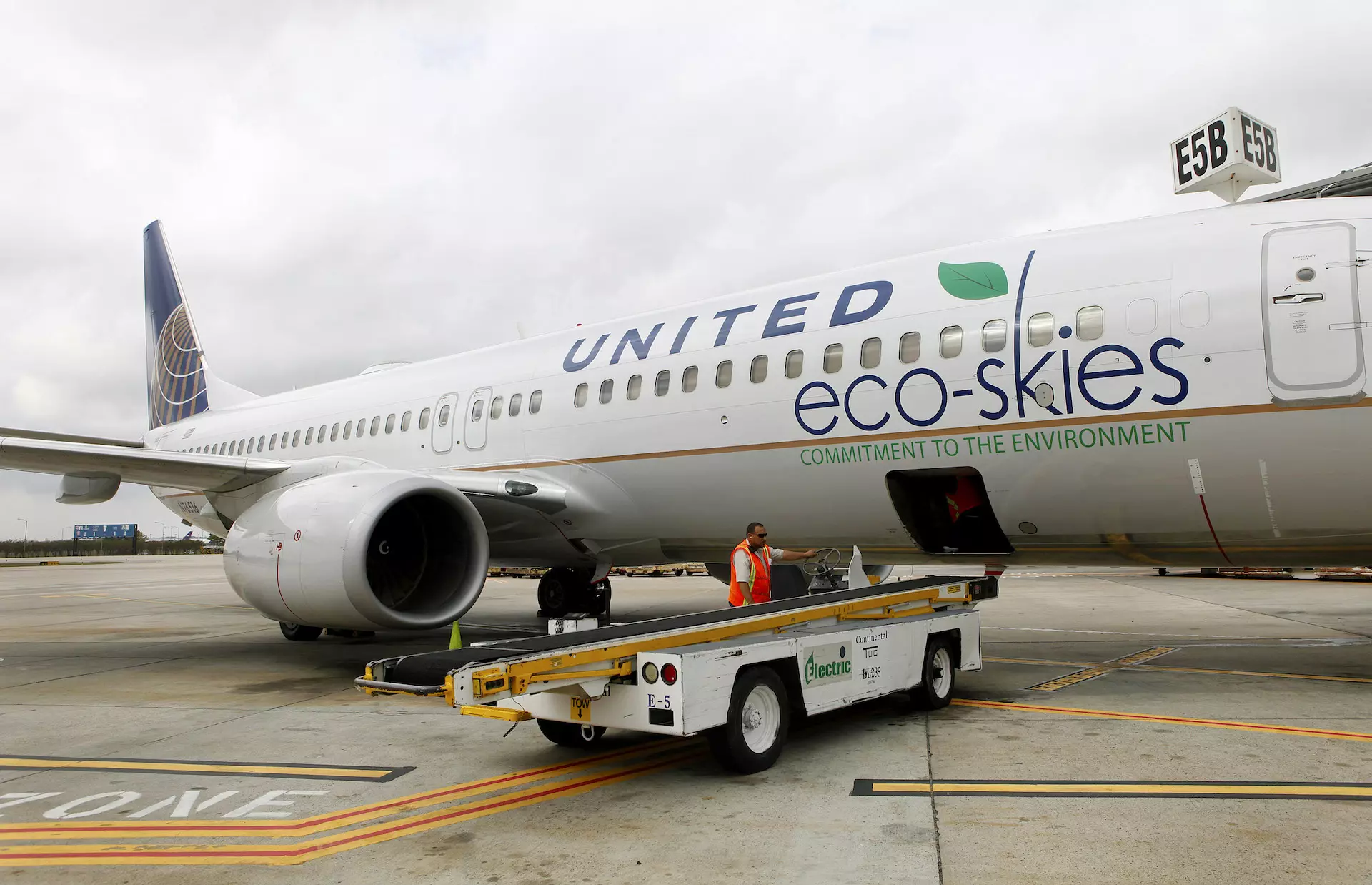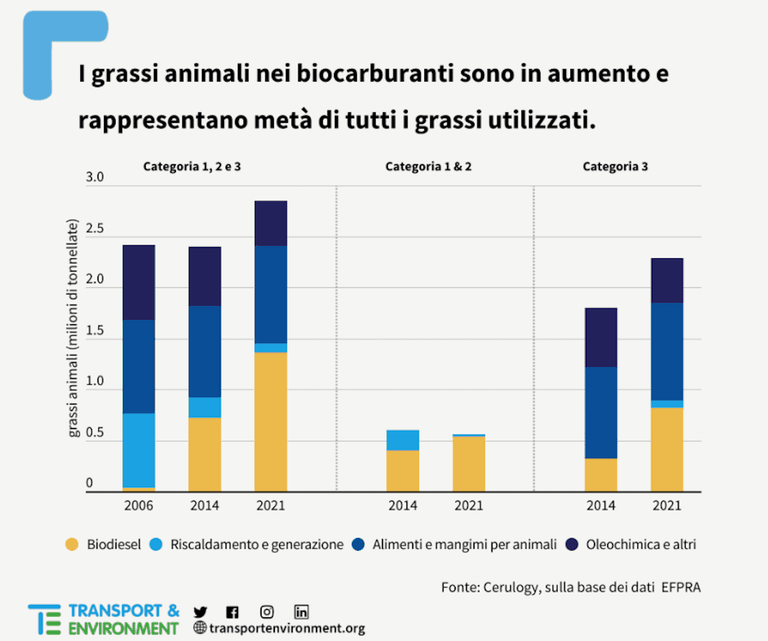https://www.lifegate.it/grassi-animali-biocarburanti
- |
- In Europe, almost half of biodiesel is made from dead animal waste.
- Often, animal fats are downgraded to become biofuels, to the detriment of the pet food industry.
- Italy is among the main users of biofuels.
When you hear about biodiesel, animal carcasses do not come to mind.Yet, in Europe, almost half of all animal fats discarded by the meat industry become biofuels.These go to fuel the airplanes we use to move from one country to another and one of the largest producers is Italy.This is in a few words the picture painted in the latest report published by the NGO Transport&Environment.

8,800 pigs are needed for an intercontinental flight
“Flying pigs” is an expression that has never been heard before but which could become more common in the future.It was the organization that coined it Transport&Environment which he recently published a study dedicated to the use of animal fats in the production of biofuels.
T&E has calculated that they may be needed for a flight from Paris to New York in the future up to 8,800 dead pigs.This would be the quantity of pigs necessary to obtain the above-mentioned animal fats, just enough for the air route from one continent to another.If he animal fats were to become the main raw material for production Sustainable aviation fuels (Saf), the so-called “sustainable aviation fuels”, the increasing use of animal fats to fuel air and road transport in Europe will become unsustainable.
Half of all European animal fats go into biodiesel
According to the ecology group greater transparency is needed so that consumers know what ends up (and what could end up in the coming years) in so-called biodiesel.The use of biofuel based on animal fats it has doubled in the last ten years and it is 40 times higher than in 2006.
European legislators have promoted this by-product of intensive animal husbandry as a solution to reduce the environmental impact of transport fuels:we started from cars up to extend the use of these products to aircraft too and, to a lesser extent, to ships.
“However, the first limitation to be addressed is the scarcity of these meat industry residues” writes T&E.“Animal fats are necessary, and difficult to replace, for the pet food, soap and cosmetics industries;but almost half of all European animal fats are currently destined for the production of biodiesel, and between now and 2030 the consumption of biofuels produced with this raw material could triple, triggering strong competition between different sectors".
Furthermore, it should be remembered that it is the waste of an industry, that of intensive livestock farming, in turn unsustainable in terms of greenhouse gas emissions and whose dimensions and production need to be radically rethought if we want to protect the climate.“Looking ahead, biofuels produced from animal fats therefore prove to be a non-scalable and unsustainable solution for the decarbonisation of transport” cuts T&E short.
Animal fat biofuel fraud
Among other things, there is also the risk of the existence of a real industrial fraud.Animal fats are divided into three categories:1 and 2 include animal fats that cannot be consumed by humans or animals, as they are of poor quality or a potential vehicle for pathogens and diseases.These are normally only used in transport and heating fuels.THE category 3 animal fats instead, they are of better quality and are used in different sectors.
However, it happens that those in category 3 often come deliberately “downgraded” and labeled as lower category in order to be used in the transport sector and thus benefit from double economic incentive:in fact, the European Renewable Energy Directive (Red) encourages the production of animal fats for transport fuels, allowing fuel suppliers to reach renewable targets thanks to their use.Red gives priority to categories 1 and 2 for transport fuels, assigning them double their energy content (and therefore a double economic incentive) in achieving the objectives.This is why it is worth downgrading the higher category fats.
The fraud is established by the study that T&E commissioned Cerulology, an expert consultancy firm in the sector, a study that demonstrates a strong discrepancy between data reported by member states and those of the animal fat industry.If the latter, in 2021, declared that it could offer the market just under half a million tonnes of type 1 and 2 animal fats, the member states instead reported a use of these materials of around 1 million tonnes.
The discrepancy for Italy it is approximately 50 percent of the entire European stock, therefore it is the main user of category 1 and 2 animal fats in the production of biodiesel (approximately 440 thousand tonnes refined in 2021 alone).Italy, let us remember, is also spending a lot on the recognition of biofuels among the European institutions, which some time ago discussed and approved the ban on combustion engines from 2035 onwards.In this sense, our country requests that in addition to electric vehicles, the sale of those powered by biofuels is also permitted.

More and more biofuels on international flights
Major airlines, like Ryanair and Wizz Air, have recently concluded important agreements with oil suppliers for the so-called Safs (RyanAir with Shell).However, details on the exact raw materials used they are often vague.Projections obtained by the consultancy firm Stratas Advisors reveal that animal fats are expected to be the most commonly used "waste" raw material in this type of fuel, together with used cooking oil.
“Just like him used cooking oils, even animal fats appear to be potentially fraudulent” declared Carlo Tritto, policy officer of T&E Italia.“The Italian strategy of focusing on biofuels as a solution for the decarbonisation of transport appears fallacious.We hope that the government, especially in the context of the revision of the Pniec, does not want to endorse what appear, to all intents and purposes, to be deliberate frauds".
